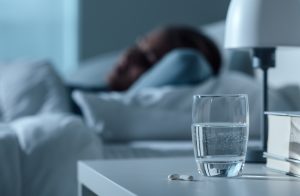
Sleeping pills, also called “z-drugs,” can be an attractive option for those struggling with sleep. But they are not without risk. New research suggests high dose z-pills may increase the risk of falls or fractures in people with dementia.
The study appeared in BMC Medicine and looked at data on more than 27,000 patients in England diagnosed with dementia between 2000 and 2016. More than 3,500 were prescribed z-drugs.
Researcher Chris Fox from the University of East Anglia’s Norwich Medical School said up to 90 percent of people with dementia suffer sleep disturbances that can substantially impact physical and mental health.
Using high dose sleeping pills, however, might not be the safest way to treat it.
Of the patients who took z-drugs, 17 percent were given high doses (a high dose is 7.5 mg of zopiclone or an excess of 5 mg of Ativan).
Instead, finding other ways to address sleeping trouble might be in order. If you’re helping to care for someone with dementia, there are some other measures you could employ.
Improving sleep hygiene might be one way to help. Setting the mood for bed about an hour or two before the head goes down can help. This can include darkening the lights, turning off screens, or encouraging a low-stimulus activity.
Paying attention to caffeine and alcohol intake is also essential.
Getting some exercise during the day can also help, as can spending some time to ease nerves through relaxing conversation or mindfulness meditation.
If sleeping pills are still required, talk to the doctor about a lower dose. The study did not find an increased risk for falls and fractures in patients who were not taking high-dose sleeping pills.